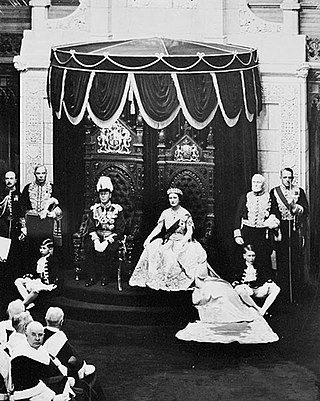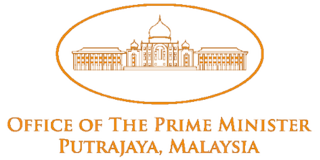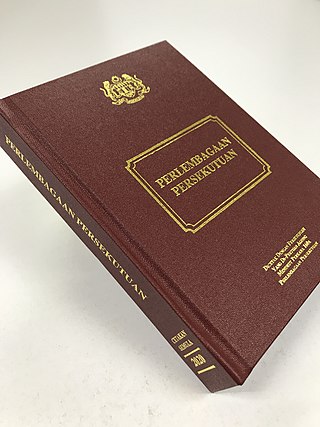
Royal assent is the method by which a monarch formally approves an act of the legislature, either directly or through an official acting on the monarch's behalf. In some jurisdictions, royal assent is equivalent to promulgation, while in others that is a separate step. Under a modern constitutional monarchy, royal assent is considered little more than a formality. Even in nations such as the United Kingdom, Norway, the Netherlands, Liechtenstein and Monaco which still, in theory, permit their monarch to withhold assent to laws, the monarch almost never does so, except in a dire political emergency or on advice of government. While the power to veto by withholding royal assent was once exercised often by European monarchs, such an occurrence has been very rare since the eighteenth century.

The prime ministerof Malaysia is the head of government of Malaysia. The prime minister directs the executive branch of the federal government. The Yang di-Pertuan Agong appoints the prime minister as a member of Parliament (MP) who, in his opinion, is most likely to command the confidence of a majority of MPs. The prime minister is usually the leader of the party winning the most seats in a general election.

The Parliament of Malaysia is the national legislature of Malaysia, based on the Westminster system. The bicameral parliament consists of the Dewan Rakyat and the Dewan Negara. The Yang di-Pertuan Agong (King), as the head of state, is the third component of Parliament.

The Dewan Rakyat, is the lower house of the bicameral Parliament, the federal legislature of Malaysia. The chamber and its powers are established by Article 44 of the Constitution of Malaysia. The Dewan Rakyat sits in the Houses of Parliament in Kuala Lumpur, along with the Dewan Negara, the upper house.
A select committee in the Westminster system of parliamentary democracy is a committee made up of a small number of parliamentary members appointed to deal with particular areas or issues.

The Federal Constitution of Malaysia, which came into force in 1957 as the Constitution of the Federation of Malaya and was amended in 1963 to form the Constitution of Malaysia, is the supreme law of Malaysia and contains a total of 183 articles. It is a written legal document influenced by two previous documents, the Federation of Malaya Agreement 1948 and the Independence Constitution of 1957. The Federation was initially called the Federation of Malaya and it adopted its present name, Malaysia, when the states of Sabah, Sarawak and Singapore became part of the Federation. The Constitution establishes the Federation as a constitutional monarchy, having the Yang di-Pertuan Agong as the Head of State with largely ceremonial roles. It provides for the establishment and organisation of three main branches of the government: the bicameral legislative branch called the Parliament, which consists of the House of Representatives and the Senate ; the executive branch led by the Prime Minister and his Cabinet Ministers and the judicial branch headed by the Federal Court.
A supermajority is a requirement for a proposal to gain a specified level of support which is greater than the threshold of one-half used for a simple majority. Supermajority rules in a democracy can help to prevent a majority from eroding fundamental rights of a minority, but can also hamper efforts to respond to problems and encourage corrupt compromises at times when action is taken. Changes to constitutions, especially those with entrenched clauses, commonly require supermajority support in a legislature. Parliamentary procedure requires that any action of a deliberative assembly that may alter the rights of a minority have a supermajority requirement, such as a two-thirds vote. In consensus democracy the supermajority rule is applied in most cases.
The states and federal territories of Malaysia are the principal administrative divisions of Malaysia. Malaysia is a federation of 13 states (Negeri) and 3 federal territories.

Voting rights of citizens in the District of Columbia differ from the rights of citizens in the 50 U.S. states. The United States Constitution grants each state voting representation in both houses of the United States Congress. It defines the federal district as being outside of any state, and does not grant it any voting representation in Congress. The Constitution grants Congress exclusive jurisdiction over the District in "all cases whatsoever".

The Dewan Negara is the upper house of the Parliament of Malaysia, consisting of 70 senators of whom 26 are elected by the state legislative assemblies, with two senators for each state, while the other 44 are appointed by the Yang di-Pertuan Agong, including four who are appointed to represent the federal territories.

The National Principles is the Malaysian declaration of national philosophy instituted by royal proclamation on Merdeka Day, 1970, in reaction to the 13 May race riots, which occurred in 1969. The riots proved at that time that Malaysian racial balance and stability was fragile. Immediately thereafter, the Malaysian government sought ways to foster unity among the various races in Malaysia. Therefore, the National Principles were formed.
The protection of basic human rights is enshrined in Constitution of Malaysia. These include liberty of the person and prohibition of slavery and forced labour. At the national level, legislative measures that exist to prevent human rights violations and abuses can be found in acts and laws on issues that either have a human rights component or relate to certain groups of society whose rights may be at risk of being violated. Human rights groups are generally critical of the Malaysian government and the Royal Malaysia Police.
The Cabinet of Malaysia is the executive branch of the Government of Malaysia. Led by the Prime Minister, the cabinet is a council of ministers who are accountable collectively to the Parliament. According to the Article 43 of the Federal Constitution, members of the Cabinet can only be selected from members of either houses of Parliament. Formally, the Yang di-Pertuan Agong appoints all Ministers on the advice of the Prime Minister. The constitution is amended by repealing the Clause (8) of Article 43, enabling a person who is a member of State Legislative Assembly to continue to serve even while serving as a minister or deputy minister in the cabinet. Ministers other than the Prime Minister shall hold office during the pleasure of the Yang di-Pertuan Agong, unless the appointment of any Minister shall have been revoked by the Yang di-Pertuan Agong on the advice of the Prime Minister but any Minister may resign from office. In practice, the Yang di-Pertuan Agong is obliged to follow the advice of the Prime Minister on the appointment and dismissal of ministers.

The 1993 amendments to the Constitution of Malaysia were passed by the Malaysian parliament with the aim of removing legal immunity of the royalty. The changes, which saw the amendments of Articles 32, 38, 42, 63, 72 and 181 in the Constitution of Malaysia, were implemented in March 1993. Before the amendments were made, the Constitution granted rulers who have violated the law not to be prosecuted by the criminal court unless he voluntarily wishes to surrender his legal immunity.

The Malaysian National Security Council (NSC) (Malay: Majlis Keselamatan Negara Malaysia (MKN), Jawi: مجليس کسلامتن نݢارا مليسيا) is a federal agency under the Prime Minister's Department. NSC is the agency responsible for coordinating Malaysia's national security policies and responses. It oversees public order, defense, and essential services at all levels of government. The NSC adapts to emerging threats and issues directives to guide the country's security efforts.

Wan Junaidi bin Tuanku Jaafar is a Malaysian politician, lawyer and former senior police officer who is the eighth and current Yang di-Pertua Negeri of Sarawak. He previously served as the 19th President of the Dewan Negara and Senator from June 2023 to his resignation in January 2024.

The Peaceful Assembly Act 2012 is the law which regulates public protests in Malaysia. According to the Barisan Nasional government, the Act allows citizens to organise and participate in assemblies peaceably and without arms, subject to restrictions deemed necessary and in the interest of public order and security.

The Security Offences Act 2012 is a controversial law supposedly "to provide for special measures relating to security offences for the purpose of maintaining public order and security and for connected matters". The Act is to replace the 1960 Internal Security Act (Malaysia). The Act was introduced by Malaysian Prime Minister Najib Razak, approved in Parliament on 17 April 2012, given the Royal Assent on 18 June 2012 and Gazetted on 22 June 2012.

The Prevention of Terrorism Act 2015, is an anti-terrorism law that was passed by the Malaysian government on 7 April 2015. It enables the Malaysian authorities to detain terror suspects without trial for a period of two years. POTA also does not allow any judicial reviews of detentions. Instead, detentions will be reviewed by a special Prevention of Terrorism Board. The POTA bill has been criticised by opposition elements as a reincarnation of the former Internal Security Act, which was revoked in 2012. The passage of POTA coincided with the arrest of seventeen suspected militants who were involved in an alleged terror plot in the capital Kuala Lumpur.
UNDI18 is a Malaysian civil society organisation (CSO) focused on Malaysian youth political empowerment, voter education and electoral reform.












